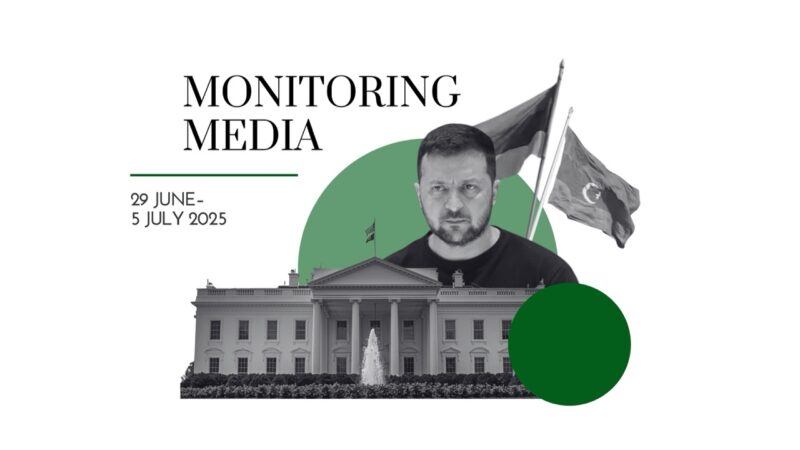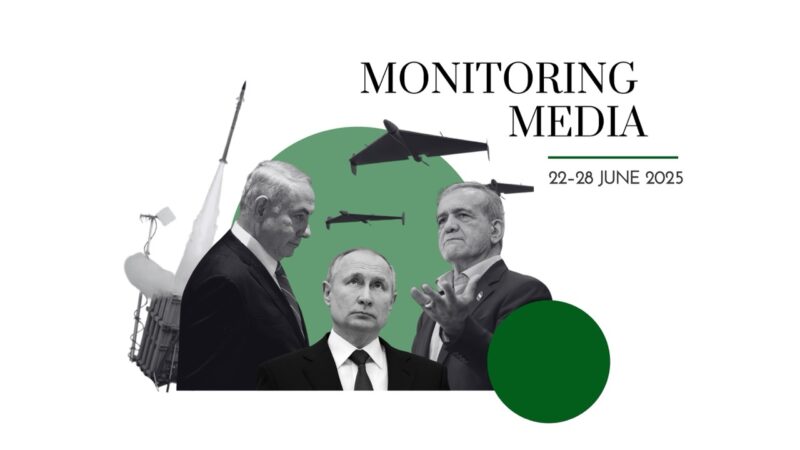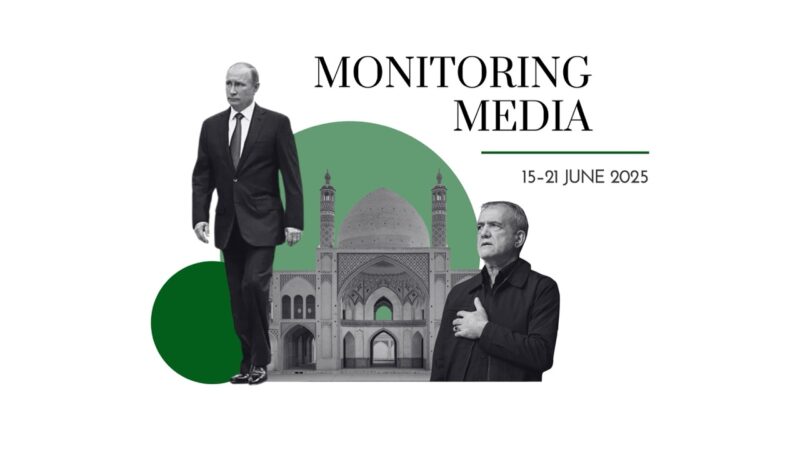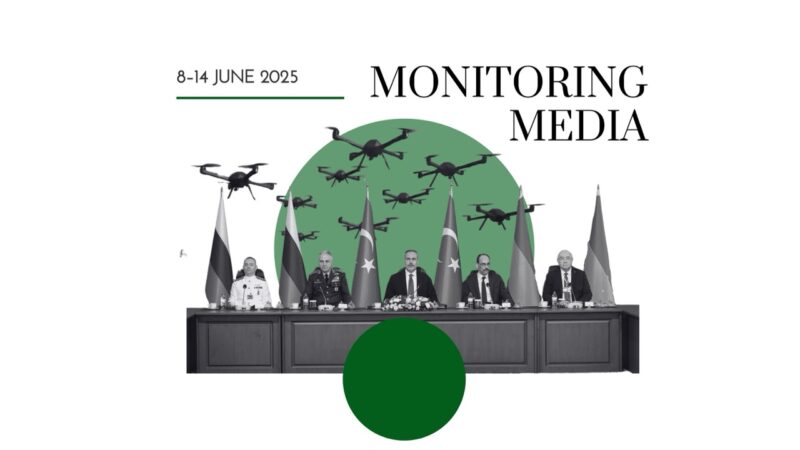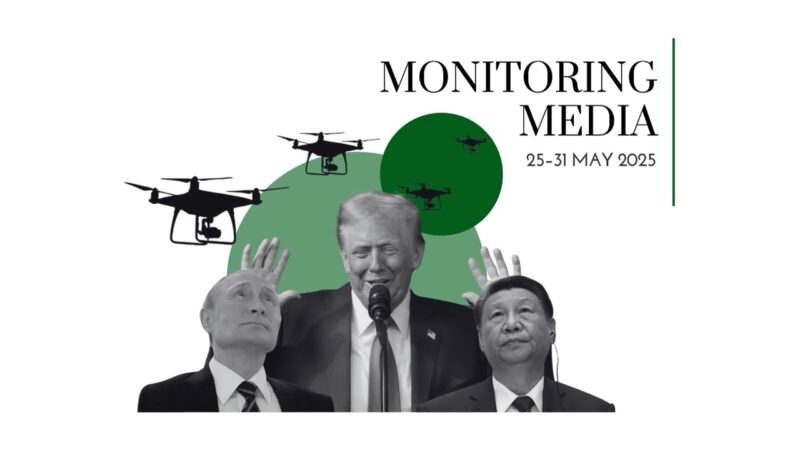Russia’s missile strikes on Ukraine signify desperation

CIUS weekly report on media coverage of Ukrainian affairs, 8–14 October 2022
Three North American magazines (The National Interest, The Economist, and The Atlantic) were selected to prepare this report on how the situation in Ukraine was portrayed in the media during the past week (8–14 October 2022). The sample of magazines was compiled based on their impact on public opinion as well as their professional reputation, popularity among the readership, and topical relevance. These three magazines represent the conservative, centrist, and liberal political spectrums.
This report covers only the most-read articles about Ukraine in the past week, as ranked by the respective magazines themselves. It also covers promoted texts on home pages, texts from special sections on Ukraine, texts from paper editions of the magazines, texts with the hashtag #Ukraine, and texts about Ukraine from opinion columns and editorials.
Topics featured in the selected articles:
- Ukraine’s current affairs: the city of Zaporizhia faces the risk of a nuclear attack; Ukraine co-awarded the Nobel Peace Prize; Ukraine’s identity has become strengthened in the course of the war;
- The world and Ukraine: the West decides to provide Ukraine with advanced air-defence systems; US is the biggest military and financial donor to Ukraine; EU may face natural gas shortages in the next few years;
- Russia and Ukraine: partial destruction of the Kerch Strait Bridge undermines the stability of Putin’s regime, provoking indiscriminate retaliation; Russia’s missile strikes on Ukraine’s cities and infrastructure serve little to no military purpose; Russia’s use of a nuclear weapon may help it win the war; Russia has not deployed all of its troops or fought with all of its power yet; Russia may drag Moldova and Belarus into its war against Ukraine; Russia’s intelligence service continues to make grave mistakes.
The most common arguments:
Zaporizhia city may be targeted by a Russian nuclear strike. Anna Nemtsova (The Atlantic) raises worries that if the war continues to be a disaster for the Kremlin, one of Ukraine’s biggest industrial centres, in the southeast, risks facing a violent attack. Nemtsova highlights that “Zaporizhzhya faces double jeopardy: Russian use of a tactical nuclear weapon near the front line and possible sabotage and destruction at the power plant downriver.” Nemtsova builds her article around interviews with the citizens and defenders of Zaporizhia, who are experiencing daily shellings by long-range missiles, who need to constantly restore destroyed infrastructure, help others escape the city, and do their best to shoot down incoming missiles and provide any kind of assistance—be it food, shelter, or words of support—to people in need. As things stand now, the residents of Zaporizhia are very poorly informed about how to survive during and after a nuclear attack. However, as Nemtsova concludes, they aren’t panicking and remain motivated to defend their city, which is only twenty kilometres from the front line.
In light of Russia’s threats of a nuclear attack on Ukraine, Kori Schake (The Atlantic) writes that the rhetoric of US President Biden only encourages Putin to be more ruthless: “the [US] president has previously expressed fears of becoming enmeshed in World War III. Last week at a private gathering of Democratic donors, he likened the current risk to the Cuban missile crisis and fretted that the world faces Armageddon.” Instead, the message that the US should have sent is that the nuclear attack will not change the outcome of the war. Such a message would “signal our commitment and diminish the power of nuclear threats.”
Ukraine winning the Nobel Prize should be appreciated, not denounced. George Packer (The Atlantic) writes about his impressions of talking to Oleksandra Matviychuk, head of Ukraine’s Center for Civil Liberties, which received the 2022 Nobel Peace Prize last week. In fifteen years of their activities Matviychuk and other members of the centre provided legal support to Ukrainians who protested against the Yanukovych regime; they subsequently spoke up for “aligning Ukraine’s criminal code with international human-rights standards, and for the rights of Ukrainian women,” and today they interview survivors of the Russian occupation in order to document war crimes for future prosecution. Discussing the recent Nobel Prize, Packer highlights that the Center shares it with Memorial, a Russian human-rights organization, and with Ales Bialiatski, an imprisoned dissident in Belarus: “For this reason, the prize has been denounced by Ukrainians who object to any implied equivalence between a country under invasion and the two aggressor countries.” Matviychuk’s statements on the issue seems to be more conciliatory: “I hope that we will be able to overcome the rage, because sooner or later the war will finish, and we will have to continue building a civilized world” and “We closely cooperate with Russian human-rights defenders, with Belarusian human-rights defenders. We understand [that] their willingness to help is because we are all human.”
Ukraine’s cultural identity becomes much stronger under Russian pressure. Veronika Melkozerova (The Atlantic) argues that “a decade of Russian aggression has made people in Ukraine…far more suspicious of [their] neighbor’s cultural influence. The current invasion, which began in February, has turned many of [Ukrainians] into fierce advocates of [their] own language, literature, and music.” To illustrate Ukraine’s quest to refine its cultural identity, Melkozerova provides the example of public debates about what should be done with the Mikhail Bulgakov museum in Kyiv. Many contemporary Ukrainian writers favoured closing it because during his life, Bulgakov hated the idea of Ukraine’s uniqueness and independence from Russia. Based on her own personal experience, Melkozerova demonstrates how she left the Russkii mir (“Russian World”) and discovered the richness of Ukrainian culture. She highlights that following the Russian invasion, the percentage of people who recognise the importance of the Ukrainian language, literature, and music has raised all across the country: “Language and music have proved to be powerful weapons on the home front, just as High Mobility Artillery Rocket System equipment has on the war front.” Melkozerova concludes with the hope that Ukrainian culture may become a foundation for the growth of new democratic and inclusive values of a new state, “where differences of opinion are tolerated and even celebrated.” This is one of the reasons why the Bulgakov museum still stands.
The West will provide Ukraine with one of the most advanced air defence systems. In light of Russia’s most recent indiscriminate missile strikes on Ukraine’s cities and infrastructure, The Economist looks into the issue of how Western assistance may help Kyiv defend its citizens. The magazine briefly outlines the history of Kyiv’s air-defence requests to the West, which have never been fully addressed. It also writes about the strong and weak points of Israel’s Iron Dome system and Soviet-made BUK or S-300 air-defence units. The response from the West will be twofold. The first system to appear in Ukraine’s arsenal will be the German IRIS-T, capable of “establish[ing] a defensive line up to 100 km long, covering the main routes Russian missiles are using.” The second system will be the Norway-made NASAMS, which possesses similar characteristics to the IRIS-T—namely, the ability to analyze information from many radars simultaneously and launch interceptive missiles for 40 kilometres. The comparative advantage of the NASAMS is its large existing stocks of ammunition, as this system is used by twelve countries, including NATO members. Ukrainians have already been trained to operate both systems. The Economist also highlights that the US’s Patriot systems remain beyond Ukraine’s reach, as they are very expensive to use and require dozens of well-trained soldiers to function properly. The Economist concludes that when both systems are deployed, “Ukraine should be able to improve its rate of shooting down Russian cruise missiles, currently thought to be between 40–60%.”
The US remains the world’s biggest military and economic supporter of Ukraine. The Economist presents data from the Kiel Institute for the World Economy, including the amounts of assistance that Western states have designated for Ukraine. The unsurpassed leader by any measure is the US: “between January 24th (one month before the latest invasion) and October 3rd, America accounted for 56% of the total commitments. This compares with 40% from European countries collectively.” The Economist also highlights that within the EU differences are also sharp. In terms of percentage of GDP, Latvia, Poland, and Estonia have made substantial commitments (around 1 per cent of their GDP has been invested in equipment, weaponry, and ammunition for Ukraine). Norway, Czechia, and Poland have been the most generous in sending weaponry from their national arsenals (24, 17, and 13 per cent, respectively). That being said, The Economist encourages the EU member-states to take on a greater financial and military burden in supporting Ukraine: “It is, after all, Europe’s security that is most gravely at risk.”
The EU risks running out of natural gas by March 2023. The Economist writes that the EU’s energy sanctions on Russia are putting all its member-states in a tricky position. In case of the cold winter this year, gas stores will not suffice to cover the existing demand, not to mention saving some for the next year. Therefore, the EU needs to work on diversifying its energy supplies, which includes exploration of the existing opportunities on the continent, such as extending the functioning of the Groningen Gas Field in the Netherlands or building up a more diverse system of pipelines. The Economist concludes that “Europe’s politicians must stop acting as if the energy shortage is a one-winter affair that can be weathered by handing out subsidies. Unless they redouble their efforts to bring supply and demand into balance, they risk a worse and more costly energy crisis in 2023 or beyond—one for which Ukraine could end up paying a big share of the price.”
Stability of Putin’s regime further eroded by attack on Kerch Strait Bridge. Eliot A. Cohen (The Atlantic) writes that while no one knows the exact details of how the Ukrainians managed to strike the bridge, its partial destruction became “one of the great inflection points of this war—the moment when Russian elites began to understand that they are losing.” All of Russia’s previous retreats from occupied territories could be explained by poor decisions of the command and, theoretically, corrected by replacing the responsible staff. The strike on the bridge was, instead, an assault on the “symbol of the project of Russian imperial restoration” and became a most unwelcome present on Putin’s 70th birthday. Moreover, scattered across thousands of kilometres of the front, Russian troops face the risk of further retreats, as their crucial supply line was damaged. In this light, tensions arise between different camps of Russia’s elites, centred around the figures of Ramzan Kadyrov and Yevgeny Prigozhin, which may signify their readiness for bids for power in the Kremlin. The security services and army structures seem to have built capacities for inflicting violence not only outside but within the borders of Russia. Putin responded to all this by appointing a notorious general—Sergey Surovikin, known for his cruelty in Syria—to lead Ukraine’s endeavour and turn the tides for Russia. After all, in society dissatisfaction has grown with how the “special military operation” has been waged. Cohen argues that “Russian paranoia about the West, a combination of grievance and thwarted desires to restore an imperial state, has created an atmosphere in which measured policy is impossible.” Therefore, the more Ukrainians achieve on the battlefield today, the less stable Putin’s regime becomes (especially if Ukrainians can strike the Kerch Strait Bridge again and liberate Kherson).
Russia prepares to retaliate for the strike on the Kerch Strait Bridge. The Economist opens the article with a statement that “the attack on Vladimir Putin’s pet project matters militarily and symbolically.” Much of how the attack happened remains unclear, while Ukraine is not confirming its engagement and Russia’s arguments are weak (e.g., the explosion of the truck on the bridge could not lead to this kind of damage). What is known for sure is that after the strike, the bridge lacks at least two road sections and a part of its railway became unoperational. On top of this, Russian defence structures discredited themselves as they allowed the bridge to suffer damage regardless of numerous precautions, which presumably included twenty protection features. The Economist considers that the effects of the incident are hard to overestimate: “the Crimean bridge is critical to the war effort—its railways are the only high-capacity line serving Russia’s troops in the south of Ukraine.” Apart from this, the attack on the bridge is another hit to Putin’s reputation in Russia; the bridge was the major symbol of the seizure of Crimea that was authorized by him. The Economist concludes that “it would be wise to expect Russia to step up attacks on Ukraine in the coming days—most likely using Iranian-made drones.”
Phillips Payson O’Brien (The Atlantic) also discusses the political impact of what was plausibly Ukraine’s attack on the Kerch Strait Bridge and Russia’s retaliation. He argues that Ukraine’s military proved itself to be “clever, well prepared, willing to undertake complex operations, and focused on maximally damaging its enemy’s ability to fight.” Meanwhile, the Russian military, and specifically its response with indiscriminate missile bombardment of Ukraine’s cities starting on 10 October demonstrated that it is “prone to bursts of rage and is open to committing any crime possible, but its actions are ultimately self-defeating.” Payson O’Brien provides numerous arguments to highlight the superiority of Ukraine’s war effort and argues that Russia has taken one step closer toward defeat: “although Russia’s sadistically eye-catching missile campaign might play well on Russian TV, it is an expensive strategic disaster for Russia’s military goals.”
Russia’s missile attacks on Ukrainian cities are of dubious strategic value. The Economist provides an overview of how the attack on the Kerch Strait Bridge became possible and what sequences of events it triggered. In particular, The Economist tries to outline the reasons behind the massive retaliatory Russian shelling of Ukrainian cities and infrastructure, 83 missiles in total, which does not look like coldblooded revenge: “Many missiles fell nowhere near any plausible military target, suggesting that the projectiles were either inaccurate or the barrage was intended to be indiscriminate.” Some of Ukraine’s major cities were hit or left without electricity, and more than 12 civilians are believed to have been killed. The Ukrainian side claims that it intercepted 43 out of 83 missiles, which is a very efficient performance. One of the reasons behind Moscow’s massive shelling that commenced on 10 October may be the intent of Sergei Surovikin, the general newly appointed as overall commander of the war, to make an introductory statement. The general is known for committing many crimes throughout his career—specifically, ordering the bombardment of Syrian cities. That being said, a massive missile attack is also a gamble on the side of the Kremlin as, according to Western intelligence, Russia has already fired 70 per cent of its precision-guided missiles. The Economist concludes that after the attack on the Kerch Strait Bridge, Belarus started seriously considering joining the war on the side of Russia, with authoritarian President Aliaksandr Lukashenka unexpectedly accuseding Ukraine of attempting to “open a front” against his country.
If it fires a nuclear weapon, Russia may win the war by losing it. Dan Goure (The National Interest) writes that “if Ukrainian troops, armed with an array of Western weapons, continue their counteroffensive, they will pose a threat to the Russian homeland in the form of its newly acquired territories. Putin will respond by doing what he has repeatedly warned he would do: employ nuclear weapons. Whether such a use is against a target in Ukraine or just a demonstration shot, the effects would be the same. Such a move would undoubtedly undermine Western support for Kyiv, given that the United States and NATO are virtually certain not to respond in kind. It could also lead to the collapse of the NATO alliance. In essence, Putin might win by losing.” Goure believes that the West is not ready to respond with a nuclear attack on Russia if Russia launches a nuclear attack on Ukraine. He also believes that no matter what kind of weapons Ukraine receives from the West, it would not lead to a fast end to the war but only help Ukraine to hold off the offensive army for a time.
Russia has not yet applied all of its conventional power in Ukraine. Leon Hadar (The National Interest) argues that Russia has many other options up its sleeve to defeat Ukraine besides using nuclear weapons. He also mentions that conventional weaponry may even be more effective for achieving military goals than nuclear, as history demonstrates: “the single most destructive bombing raid in human history was not the United States’ detonation of the atomic bomb over Hiroshima and Nagasaki, Japan, but the firebombing air raid on Tokyo by the U.S. Air Force during two nights in March 1945. That raid left an estimated 100,000 Japanese civilians dead and over one million homeless.” Hadar assumes that experiencing massive conventional bombardments of its major cities, “Ukraine’s Zelenskyy would come under pressure from his people to reach a deal with the Russian devil.” Hadar concludes that Russia is yet to demonstrate all of its fighting power, specifically its air superiority, which will leave the West with two choices: to join the war on Ukraine’s side or to press Kyiv to negotiate.
Russia likely considering opening new fronts in Belarus and Moldova. Eugene Chausovsky (The National Interest) writes that “On October 10, Belarusian president Alexander Lukashenko announced the formation of a ‘joint military group’ with Russia following his claims that Ukraine was preparing to attack Belarus. On the same day, Moldovan Deputy Prime Minister Nicu Popescu said that Russian missiles had crossed Moldova’s airspace on their way to Ukraine. Moldovan president Maia Sandu subsequently called for expanded police powers to address pro-Russian street protests in the country.” Chausovsky argues that such turns signify the Kremlin’s consideration of two scenarios for continuing the war: the first is to increase the scale by deploying nuclear weaponry, and the second is to increase the scope by exporting the war to Ukraine’s neighbours. Both Belarus and Moldova are reluctant to engage in the Russo-Ukrainian war, but they may be forced to do so. Authoritarian president Lukashenka has long been under pressure from Putin to deploy Belarusian troops to Ukraine. In turn, on the Ukraine-Moldovan border there remains the Russia-controlled Transnistria region, which may explode with violence on the Kremlin’s order.
Russia’s intelligence lacks professionalism. The Economist writes that Russia’s secret and security services, and especially the department of intelligence, came very poorly prepared for the war. Their networks lacked the insight to prevent the explosions on the Kerch Strait Bridge or save Daria Dugina, daughter of Russia’s nationalist mastermind, who is believed to have been assassinated by Ukrainian operatives in Moscow. Also, Russian intelligence did not prevent the US from publishing plans for the escalated invasion before it happened. Worse than this, the intelligence failed in its predictions of how the invasion would develop: “its officers largely spoke to those Ukrainians who were sympathetic to Russia and exaggerated the scale of their agent networks in the country, giving the Kremlin the false impression that the Ukrainian government would quickly collapse.” The Economist also writes that the professionalism that the intelligence services could boast of during the Soviet times has been eroded by systemic corruption. Being a Russian agent today is more about prestige and luxury lifestyles than responsibility. Finally, Russian intelligence is encountering more difficulties and failures compared to its Western counterparts in keeping the identities of its agents concealed in the globalized world.
Worth your attention:
Russian nuclear strikes would not lead to its victory over Ukraine. Dan Goure (The National Interest) argues that if Russia uses nuclear strikes against Ukraine, this would solidify Putin’s regime at home, legitimize Russia’s grabs of Ukraine’s territory, and discourage the Western world from supporting Ukraine: “the likely Western response would play right into Putin’s hands. His initial nuclear use would be met with a less than proportionate response, demonstrating Western weakness. Moscow will have gotten away with using a nuclear weapon, shown that deterrence is meaningless, and set itself up to use nuclear weapons again in the future. Putin’s fortunes at home would certainly improve. He would claim to be the Russian leader that stood up to the West and got away with employing a nuclear weapon to defend the Motherland.”
The arguments presented by Goure seem to be one-sided. The analyst does not provide the reasons that have motivated the West to support Ukraine in the first place. One such reason is the vital necessity to respond to blatant violations of international law and the UN Charter. If these violations succeed and international law fails, all states—and above all, countries of the West—will face much more global instability than there exists today.
Another reason is the necessity to guarantee European and Western security generally. Western states that had become habituated to economic trade instead of military planning started off unprepared to confront Russia’s hybrid and explicit military aggression—particularly as they were taken aback by it, perceiving any such unprovoked actions to be unreasonable and harmful in the first place. Therefore, if Russia wins against Ukraine, the threat of new wars and human disasters will loom ever closer over Europe and its neighbourhood. This threat is one that the Western states have not experienced for decades and cannot ignore today.
Also, Goure pays little to no attention to the thousands of Ukrainians who are very motivated to fight regardless of nuclear threats.
Goure deliberately underestimates declarations of the Pentagon officials that the US response to Russia’s use of nuclear weaponry will be very decisive and include the physical destruction of Russia’s military potential. For more information, we recommend reading an article by Christoph Bluth and listening to one of Timothy Snyder’s latest lectures, which points out the dangers of dissociating ethics from capitalism.
Russia’s capabilities in waging conventional warfare are limited. Leon Hadar (The National Interest) puts the hypothesis forward that “Russia’s failure to gain air superiority in Ukraine may reflect, as some analysts suggest, their lack of experience in using air power as a strategic tool, or more likely, the Russian air force has held back its full capabilities.” Hadar believes that if Russia decides to deploy its “more than 1,500 combat aircraft … the costs for Ukraine and its civilian population would be overwhelming.”
Hadar may be right in portraying Russia as a formidable offensive power with thousands of aircraft in reserve. However, he does not consider many important arguments, such as the necessity for well-trained pilots, the technical condition of available aircraft, the ability of Russia’s army to wage combined warfare (and defend its aeroplanes from the ground), its inflexible and centralized command (with Putin personally planning many offensive operations), corruption in the Russian military, and other factors.
To obtain a broader perspective on why Russia is not likely to gain superiority in using conventional weapons, we recommend articles by Mykola Bielieskov and Phillips Payson O’Brien.
